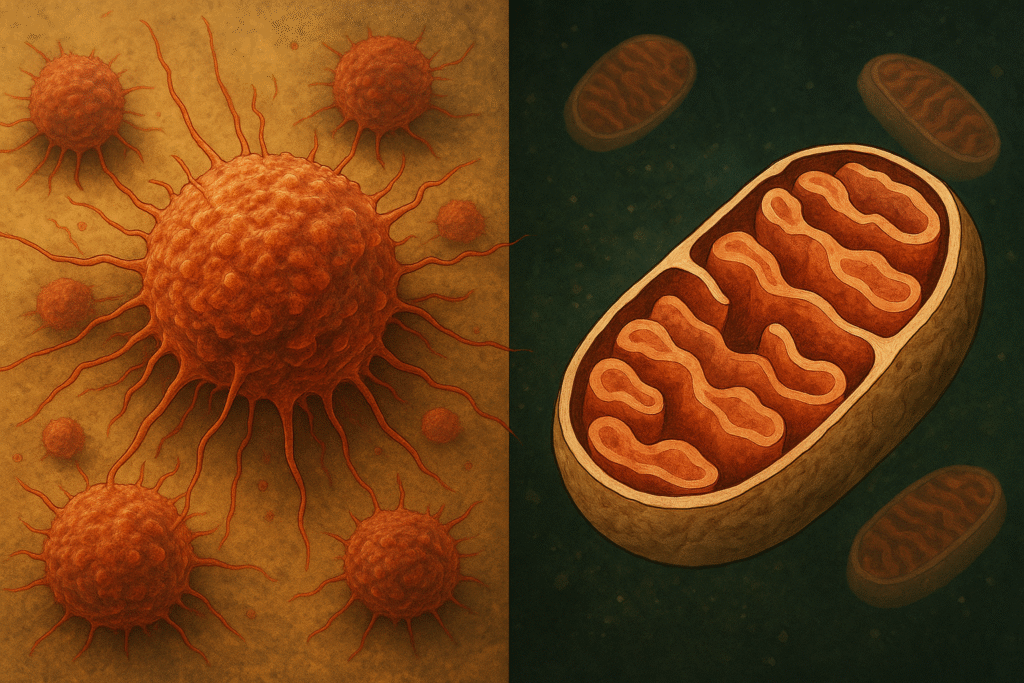We’ve all been told the same thing for years—cancer is just bad luck, a genetic mistake that spirals out of control. That story makes it sound like we’re powerless, like we’re just waiting around hoping we don’t get hit with the wrong roll of the dice.
But new research is showing something completely different, and honestly, it’s exciting. At the root, cancer looks less like a random genetic thing and more like a metabolic disease—meaning it starts with how our cells handle energy.
For me, that changes everything. It doesn’t throw out genetics, but it gives us something way bigger and more hopeful. If cancer is tied to metabolism, then the daily choices we make actually matter. What we eat, how we handle stress, how much we sleep, whether we live in rhythm with nature—all of it shapes the environment inside our bodies. That means we’re not victims. We actually have some control here.

What the Science is Saying
The Warburg Effect Back in the 1920s, Otto Warburg noticed something strange. Cancer cells don’t act like normal cells. Instead of using oxygen to make energy, they basically binge on sugar and ferment it for fuel, even when oxygen is available. It’s inefficient, but it helps them grow fast.
Mitochondria Gone Wrong Fast forward to now, and scientists are realizing that a lot of cancers start with broken mitochondria—those tiny “power plants” in our cells. When they can’t use oxygen and fat efficiently, the cells switch to sugar fermentation. That shift opens the door for cancer to thrive.
Metabolic Therapies This is why researchers are experimenting with stuff like ketogenic diets, fasting, hyperbaric oxygen, and even drugs that target metabolism. The whole idea is to change the environment so cancer cells can’t thrive while healthy cells get stronger.
Looking at the Bigger Picture: Body, Mind, Nature
Eating Like Our Ancestors Think about this: a little over 100 years ago, the average person ate as much sugar in a year as we now eat in just 11 days. Let that sink in. Our great-grandparents weren’t constantly spiking their blood sugar. They ate real, nutrient-dense food, and their bodies stayed in rhythm with nature. Going back to that style of eating makes it way harder for disease to set in.
Mind–Body Connection We also can’t ignore stress. When stress is high, cortisol rises. Cortisol pushes blood sugar and insulin up, which is literally the fuel cancer cells use. That means meditation, breathwork, prayer, slowing down, and sleeping better aren’t just “wellness trends.” They actually change your biology. They flip the switch from survival mode back into balance.
The Design of Nature Look at a forest or a river system. Energy flows in cycles, everything supports the whole. Cancer is like a cell that decides to stop playing by those rules. It hoards energy, refuses to cooperate, and breaks the harmony. Healing isn’t just about attacking the bad cells—it’s about restoring flow. Health is our natural state. Disease is what shows up when we drift too far out of rhythm.
What This Means in Real Life
Eat with Intention Food isn’t just calories. It’s information. It tells your cells what to do. Eat real food that strengthens you, not sugar and processed garbage that drags you down. For some people, low-carb or keto (done right) can be a game-changer.
Strengthen Your Mitochondria Your cells adapt to how you live. Fasting, moving your body every day, even cold exposure—these things actually train your mitochondria to become more efficient.
Look Past Just Diet Healing isn’t one-dimensional. It’s not just about food. It’s about sleep, reducing stress, connecting with people, moving in ways that feel natural. All of this feeds into your metabolism and builds an environment where health wins.
A New Paradigm of Hope
Here’s the part that fires me up. This shows us that nutrition, stress, lifestyle, and living in sync with nature aren’t just random health tips. They’re the foundation of resilience—the stuff that keeps us alive and thriving. New 2025 research from Frontiers in Oncology (“Metabolic Shifts as Early Predictors of Cancer Risk”) is building on this, showing how changes in glucose and lipid metabolism might spot cancer risk 2-3 years ahead—pretty wild stuff to watch unfold!
Health isn’t some impossible puzzle. It’s built into us. When we align with how our bodies were designed, things start to click. We feel better, we get stronger, and we can create the conditions where health takes the lead and disease fades into the background. Start small—maybe skip breakfast one day a week or trade that afternoon candy bar for a handful of nuts. Your mitochondria will thank you!
That’s the hope I see: we’re not stuck waiting for bad luck or random mutations. We can take action right now. And honestly, that’s the kind of truth I want people to know—because once you see it, you can never go back to feeling powerless again.
Sources:
Seyfried, T.N. Cancer as a Metabolic Disease (2012).
Pavlova, N.N., Thompson, C.B. “The Emerging Hallmarks of Cancer Metabolism.” Cell Metabolism (2016).
Klement, R.J. “Fasting, Fats, and Physics: Merging Ketogenic Diets with Radiation or Hyperbaric Oxygen.” Frontiers in Nutrition (2019).
“Metabolic Shifts as Early Predictors of Cancer Risk: Insights from Longitudinal Cohort Data.” Frontiers in Oncology (2025).

Leave a Reply